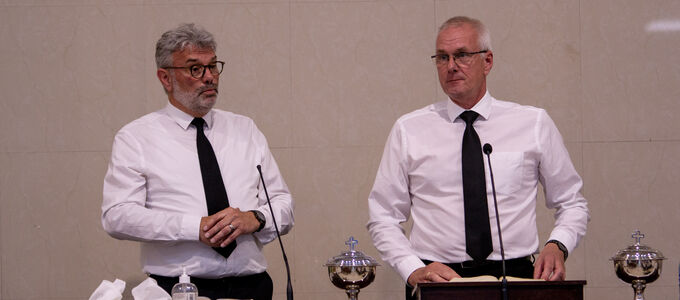
The divine service for ministers on 30 July was all about fear and joy. Chief Apostle Jean-Luc Schneider explained exactly how these two concepts fit together with reference to an Old Testament Bible text that is still highly relevant today.
As part of his message of greeting in Paramaribo, Suriname, Chief Apostle Jean-Luc Schneider thanked the ministers for their work in the Church: “Whenever I see brothers and sisters in a particular country, I am aware that this is only possible because there are brothers there who are committed to serving the Lord and serving in their ministry. For this reason I would like to take this opportunity to thank you, dear brothers and dear sisters, for your willingness to serve.”
For this divine service, Chief Apostle Schneider made use of a Bible text from Psalm 2: 11: “Serve the Lord with fear, and rejoice with trembling.” While this Bible text is recorded in the Old Testament, “we see it as a prophecy of the coming of the Son of God to this earth,” he said. The Chief Apostle then went on to unlock the further content of this Bible text.
Serving the Lord
“Jesus Christ has given the ministers ministerial authority so that they may serve. This means that they must engage their strength, make an effort, and really endeavour,” said the Chief Apostle. “Therefore we cannot serve the Lord just by ordering others around and telling them what to do.”
Rather, to serve means
- to learn: “this means that we must read the Bible and study the Catechism again and again.”
- to build trust in pastoral care: “We must build up a relationship of love. That is our work, not the work of the members. At times it takes a long, long time before the members realise: ‘Oh! He loves me. I can trust him.”
- to cultivate congregational life: “These are very specific organisational tasks.”
Serving the Lord also means submitting to His authority. “We—and you already know this—do not want to preach or proclaim our own opinions,” the Chief Apostle reminded the ministers. Rather, the task of the minister is to preach the gospel of Jesus—and indeed, it is important to preach the gospel as a whole. “Well, you know, there are also—how should I put it?—parts of the gospel that are not so pleasing to one or the other.” Nevertheless, “we proclaim the word of God, the gospel, in all its fullness.”
Serving with fear
“Naturally, this has nothing to do with being afraid,” clarified the Church president. “We have a holy reverence before God, before His majesty, a holy respect for His omnipotence and knowledge, as well as deep reverence and gratitude toward Jesus Christ.”
Serving with fear means:
- keeping the commandments of Christ: “Since the Lord has entrusted us as ministers with a special position, we should be the first to keep the commandments.”
- loving God: ‘Here I do not need to do a lot of explaining. You know this: our motivation is love for God and love for Jesus Christ, not to gain any sort of advantage.“
- not being afraid: “Serve the Lord with fear, in the knowledge that He is the Almighty. No man and no spirit is stronger than He! Those who fear the Lord do not need to fear anyone else.”
- being aware that we will have to give account to God: “At some point, God will ask me the question: ‘What did you do with the gifts and talents I gave you? Did you really work with them? Did you really learn?’”
Rejoicing with trembling
“Naturally, this sounds a little strange,” acknowledged the Chief Apostle. “However, this trembling has nothing to do with being afraid either. When it talks about trembling here, today we would say, ‘rejoice with your whole being, with your whole heart.’ This means that we should rejoice in the very core of our being.”
The reason? “I rejoice because the perfect Son of God, Jesus Christ, loves me! I rejoice because the perfect God has elected me and wants me to be with Him in all eternity. I rejoice because the Lord is going to return in order to take me to Himself.”
The Chief Apostle also reminded the ministers of the many times that God had responded to their prayers, which is also grounds for rejoicing: “Before every divine service you pray, ‘Dear God, help me!’ And how many times has He already acknowledged Himself to this prayer?” And then the Chief Apostle went on to remind the ministers about the joy the Lord Jesus inspired in Apostle Paul in Acts 20: 35: “It is more blessed to give than to receive.” Those who have such an attitude of heart can indeed rejoice most deeply, promised the Chief Apostle.
“Let us be joyful in our activity,” said the Church leader in closing. “We rejoice that God loves us. We rejoice over the activity of God in His work, and we create reasons to rejoice by always giving our neighbour more than he gives us.”
















